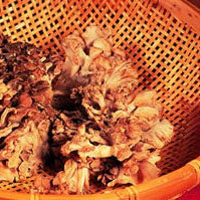Penn Herb Wellness Guide
MaitakeFind Products
 © Martin Wall
© Martin WallHow It Works
A common denominator among some mushrooms and some herbs is the presence of complex polysaccharides in their structure. These active constituents help support immune system function and are sometimes called immunomodulators. The polysaccharides present in maitake have a unique structure and are among the most powerful studied in test tubes to date.2 The primary polysaccharide, beta-D-glucan, is well absorbed when taken orally and is being studied as a potential tool for prevention and treatment of cancer and as a adjunctive treatment for HIV infection.3, 4 Animal studies suggest maitake may lower serum cholesterol and triglycerides.5, 6 However, this research is still preliminary and requires human trials for confirmation.
How to Use It
Maitake can be used as a food or tea and is also available as a capsule or tablet containing the entire fruiting body of the mushroom. For maitake, the fruit body is higher in polysaccharides than the mycelium, which is why it is recommended. Whole-mushroom maitake supplements, 37 grams per day, can be taken.7 Liquid maitake extracts with variable concentrations of polysaccharides are available, and should be taken as directed.
Copyright 2025 TraceGains, Inc. All rights reserved.
Learn more about TraceGains, the company.
The information presented by TraceGains is for informational purposes only. It is based on scientific studies (human, animal, or in vitro), clinical experience, or traditional usage as cited in each article. The results reported may not necessarily occur in all individuals. Self-treatment is not recommended for life-threatening conditions that require medical treatment under a doctor's care. For many of the conditions discussed, treatment with prescription or over the counter medication is also available. Consult your doctor, practitioner, and/or pharmacist for any health problem and before using any supplements or before making any changes in prescribed medications. Information expires December 2025.


